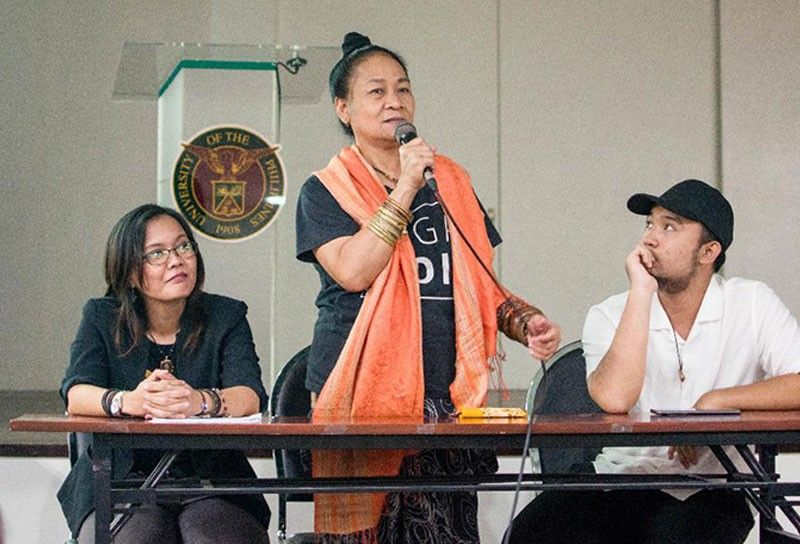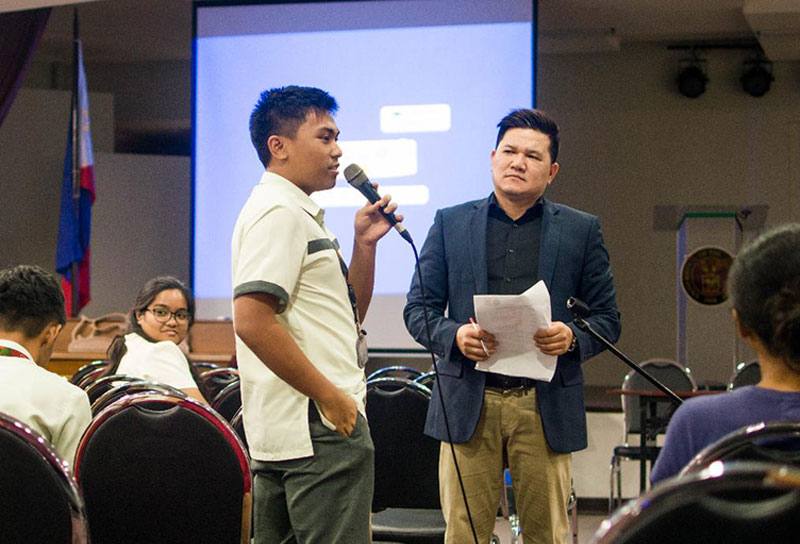UP Cebu holds Centennial Film Showcase

CEBU, Philippines — On a fine Friday the 13th, the Performing Arts Hall of the University of the Philippines Cebu witnessed the gathering of Bisaya filmmakers. What did these talents all have in common? Having been part of the UP Cebu family as faculty and students.
Celebrating 100 years of quality education, research, extension and service to the country – one of the events leading up to the highly anticipated centennial celebration was the UP Cebu Centennial Film Showcase presented by the University of the Philippines Alumni Association, and the College of Communication, Art and Design. Featuring films and documentaries by UP Cebu alumni, faculty, and students, the Centennial Film Showcase recalled and celebrated the contributions and milestones made by these UP Cebu affiliates in the thriving Cebuano film industry.

A student from UP High School Cebu shares his thoughts about the films “Unscathed” (directed by Denzel Yorong) and “Ina-Tay” (directed by Chloe Veloso) that were showcased at the UP Cebu Centennial Anniversary Film Festival at the UP Cebu Performing Arts Hall as UP High Principal Aurelio Vilbar, who hosted the event, looks on.
Students from UP High marvelled at the screening featuring critically acclaimed gems like that of Remton Zuasola’s suspense-filled “Swap” and Ditsi Carolino’s riveting documentary “Bunso.”
Other short films screened were “Ina-Tay” by Chloe Veloso, “Operation Prutas” by Ara Chawdhury, “Pleasant Words” by Bugs Saavedra, Ashley Manugas’ “Aquarium,” Bayani Miguel Acebedo’s “Rated R: A Story of Geeks and Sex” and “Onin” by Fidel Ricafranca.
Among the short documentaries featured were “Unscathed” by Denzel Yorong, Januar Yap’s “Dios-Dios,” Yap and Hannah May Gabiana’s “Ann Savage” and “Sagbayan” by Alex Badayos – all of which wouldn’t have been made without the help of UP Cebu folk.
“The purpose of this event is to honor the contributions of the members of the UP Cebu community towards the growth of Cebuano and Philippine cinema,” says Jiji Borlasa, UP Cebu Centennial Film Showcase organizer and UP instructor. “Through this event, it is my hope as a filmmaker myself that appreciation for Cebuano cinema will take root and gain much needed support and patronage from here, Cebu.”
In between screenings, an artist talk with veteran actress Ligaya Rabago, and directors Chloe Veloso and Denzel Yorong allowed the students to react and ask about the movies. Although comprised mainly of teenagers, the students made an engaging crowd: heartily laughing, gasping in disbelief, and squealing in anticipation at all the right places, asking each other questions even, and reacting as the film’s plots unfolded before them.
Despite having experienced and seen different things throughout their filmmaking journey, “Santisima,” “Lily,” “Swap” and “Magbuwag Ta Kay” star Ligaya Rabago, a seasoned actress who saw the shift from theatre to film and the growth of Cebuano filmmaking industry take place; Chloe Veloso, an award-winning film and commercial director who was right in the middle of the traditional and novel; and Denzel Yorong, a young student filmmaker and storyteller relatively starting out in the visual medium – they were all in equal footing in their hopes for Cebuano films.
The trio prove that despite the recent (and ever present) discourse on disagreements among different generations, it is possible for people of differing orientations to end up on the same page.
“The future of Bisaya films? Naa na ang future (the future is here). We are already making not only ripples, but tsunamis. We find individuals who are now engaged in filmmaking, especially in our own Cebuano language. We are there [in the future]. We see now, that our Cebuano filmmakers are renowned, and are no longer here in Cebu but are in different areas, and yet, they still go back and produce Cebuano films,” says Rabago, as she also mentions several personas who were able to uplift the Cebuano sensibility in successful releases like that of actors Dionne Monsanto, Matt Daclan and Chai Fonacier, writer Fatrick Tabada, directors Ara Chawdhury and Victor Villanueva, among many others.
Rabago, who appears in the event’s featured film “Swap” directed by Remton Zuasola, also expressed how happy she is that the hall was packed, even more so with responsive viewers.
This is the first time that “Swap” – an award-winning film about the real-life kidnapping of then two-year-old Zuasola which already made rounds in film festivals across the globe – was screened for a Cebuano audience. It can’t be certain whether it was the crowd, or the film that delivered, but the production, theme, and underlying tones and messages were indeed able to stick to its young audience. Heck, the fact that it was a one long-take (no cuts) feature film was enough to lure viewers in, building the suspense with every flick of the camera, or lack thereof.
Yorong, a fourth year mass communication student who directed and wrote the best documentary in this year’s Sinulog Short Film Festival, mused how important it is for filmmakers to stay true to their stories and their art. He shared how “Unscathed” – a documentary about how young Sinulog dancers from Barangay Pasil endured and competed with the knowledge that their homes were devoured by a monstrous fire and which dominated the Sinulog Short Film Festival with various awards— allowed him to witness the regard that other regional filmmakers have for Cebuano-made content after flying off to Manila in February as Region VII delegates for Cinema Rehiyon X with “Unscathed” falling under the Alternativo Stories from Home category.
Yorong says that one needs to be immersive and resourceful when creating documentaries. He adds that Cebuano films are innovative, and despite tackling all sorts of themes – from humor and sexuality, to suspense and tension, even faith and religion – Cebuanos have a knack of injecting a brand of Bisaya sensibility in them.
With that, Yorong took the opportunity to call for a more diverse and participatory film industry through the help of the audience.
“As young audiences in this information age, what we can contribute to this growing cinema scene – sige lang ta’g growing, but it’s there. Our duties as audiences is to make noise. As simple as a Facebook post about a Cebuano movie that you watch, you can share it, tweet about how you love it, how you hate it. How that movie encouraged and empowered you, even how it offends you,” Yorong begins.
“We have to create an audience that is diverse and critical, that is participatory, and that proves that cinema is alive. That it wasn’t built only by filmmakers but also the audience. We need to grow our own cinema together,” he asserts.
Film instructor and teacher Chloe Veloso agrees with both Rabago and Yorong as she bemoaned the current mindset of the public about Filipino films. One example of the problem is the fact that people only watch films because it is a school requirement, something that Veloso often resorts to, to at least expose her students one way or another.
“We have to build the audience. We can’t keep making films only for no one to watch them, although some people voluntarily watch them. It’s really sad how people would only watch it because it’s required. So we have to work on audience building and marketing. We also need more producers in Cebu, so that at least there would be more films, and hopefully more audiences are made aware, and they can grow from there,” she says.
Borlasa is thankful for the UP Cebu alumni, faculty, and students who have become stellar directors, filmmakers, and talents and have generously and willingly shared their work for the showcase. She acknowledged the support of the alumni association, and CCAD, as well as Professor Palmy Tudtud, the chair of the UP Cebu Centennial celebration, for bringing the idea of a film showcase to the table.
Borlasa shares how appreciation for Cebuano cinema has only been limited to cinephiles and critics despite flourishing both nationally and internationally. Although there really hasn’t been any space for Cebuano films in popular cinema, recent national releases of Bisaya films “Patay Na Si Hesus” and “Magbuwag Ta Kay has Borlasa saying that all of this is changing.“I can say that Cebuano movies have slowly crept into national consciousness and is changing the misnomer that Bisdak equals baduy,” she says. Photos by Niña Princess Teriapel, NORSU-Dumaguete Intern
- Latest






















